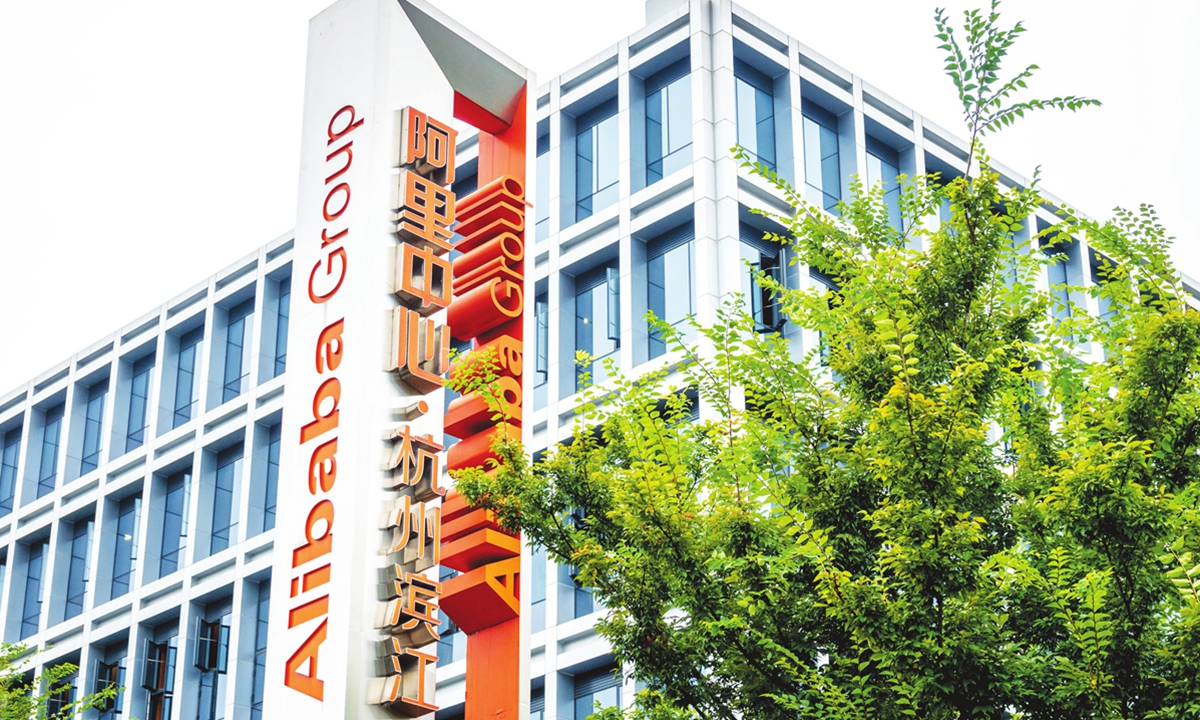
Alibaba's headquarters in Hangzhou, East China's Zhejiang Province Photo: cnsphoto
For months, many mainstream media outlets in the West have been obsessed with the whereabouts of Jack Ma, founder of Alibaba Group. These media outlets are always keen on any China-related news or even manufactured stories to smear China. Ma's "disappearance" from public view, as they described it, provides a great opportunity. Citing "experts" or outright innuendo, foreign media outlets asserted that Ma's low-profile travels overseas offer "proof" of China's crackdown on the private tech sector.
But when
reports showed Ma's return to his home of Hangzhou, in East China's Zhejiang Province, the foreign media could rest their argument that the former tech executive was "evading a tech crackdown at home," right? So, you would think. In recent days foreign media outlets doubled down and added even more to their assertions. Their claim is that the "crackdown" prompted so much pain for the economy that China is shifting its policies to "regain the confidence" of the private sector and the risk will always linger for private businesses.
All of these claims are complete nonsense, pure and simple. Yes, it's true that since stepping down as the boss of Alibaba, Ma has maintained a low-profile. Yes, China has been improving regulations for the rapidly growing tech sector - to promote its sound development. But that's completely different from what foreign media describe so simply as a "crackdown" on the private tech sector just to reign it in. And yes, Chinese authorities have recently repeatedly stressed and even taken measures to support the private sector. But that's not policy backpedaling because of "pain."
Once again, these foreign media outlets' coverage reveals just how ignorant they are about China's long-standing policies. One such policy is the unswerving support for the private sector since the reform and opening-up policies began decades ago. Such unswerving support is written into numerous development plans and top policy documents. Clearly, as usual, foreign journalists covering China do not care to read these policies or they simply ignore them - either way, it's utterly unprofessional.
But for all their unprofessionalism and bias when it comes to China, the Western media still dominates global public discourse. What they publish has an impact on many around the world. So, when they relentlessly push the narrative that China was cracking down on private tech businesses using Ma's overseas travels or other stories, they do affect the mood among some private business circles in China. Many online media posts on Chinese social media platforms translate and transfer what's been written by Western media outlets. This, coupled with actual business difficulties amid the COVID-19 pandemic, exacerbated the mood - so much so that it has caught the attention of the top leadership, hence the growing public support for the private sector in recent months.
In December 2022, during the annual Central Economic Work Conference, officials highlighted this issue - that is the "incorrect rhetoric" about whether China will adhere to a policy of unswervingly supporting the private sector - and the need to tackle it head-on. So, what we have witnessed in recent months has been top officials repeatedly stressing the policy and taking measures to support the private sector, and this is part of the solution to address that issue. For example, China's top internet regulator on Tuesday said that as part of a campaign to crack down on illegal activities on the internet, it will also severely crack down on illegal acts that maliciously damage the image and reputation of businesses or entrepreneurs.
Still, it must be pointed out that China's effort to improve regulations for the high-tech sectors to ensure both sound development and security will continue, as technological innovation continues to accelerate and its impact on all corners of society continues to grow. But that's a common trend around the world, including the US. The difference is that the US government is actually cracking down on tech firms for political and geopolitical reasons, whereas China's efforts are to ensure sound, safe development.
To put it in more straightforward terms, China's regulations for the tech sector are not part of a "crackdown" aimed to "rein it in." Otherwise, how could China's private sector be so successful. Chinese private firms account for more than 50 percent of the country's tax revenue, more than 60 percent of its GDP and more than 80 percent of urban employment.
The author is a reporter with the Global Times. bizopinion@globaltimes.com.cn




